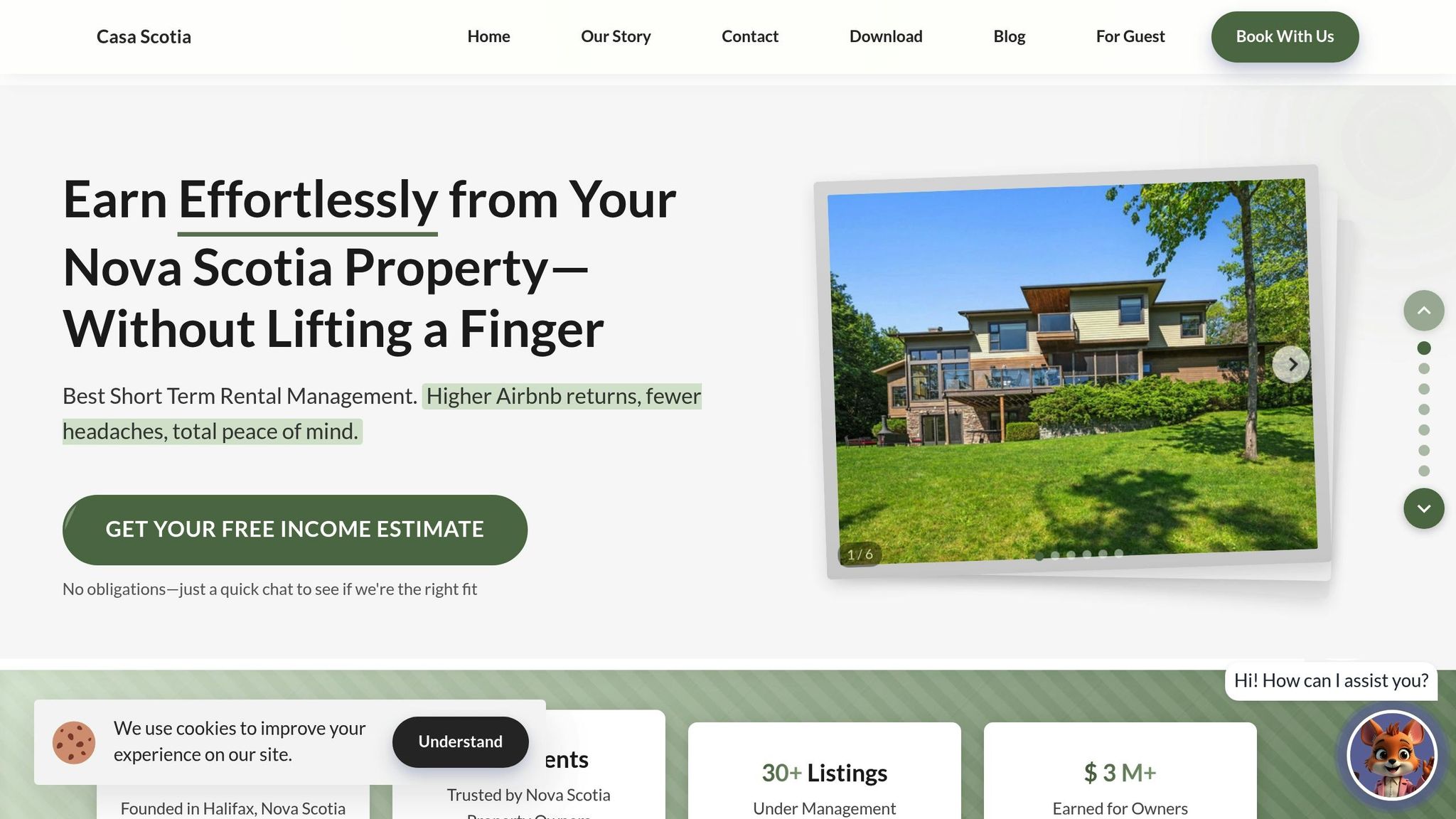Medium-term stays, lasting 14 to 30 nights, are a smart way to maintain steady rental income during Halifax's shoulder seasons (March–April and October–November). These stays appeal to groups like business travellers, digital nomads, and families in transition, offering furnished, home-like accommodations without long-term commitments. To succeed in this market, focus on:
- Key amenities: Reliable high-speed internet, dedicated workspaces, fully equipped kitchens, and family/pet-friendly options.
- Pricing strategies: Offer discounted rates for longer stays (e.g., 15% off for 14+ nights, 25% off for 28+ nights) and use dynamic pricing tools to stay competitive.
- Listing optimization: Use professional photos, highlight practical features, and include local guides for added convenience.
- Guest services: Provide flexible cleaning options, proactive maintenance, and responsive support.
For those who prefer less hands-on management, professional services like Casa Scotia can handle compliance, pricing, and guest communication. By tailoring your approach, you can turn the slower shoulder season into a profitable period.
Midterm Rental Strategy that Works
How to Optimize Property Listings for Medium-Term Guests
To attract medium-term guests, it's essential to highlight comfort, practicality, and affordability in your property listing. These adjustments not only make your listing more appealing but also set the stage for fine-tuning your pricing and amenities later on.
Highlight the Right Amenities
Medium-term guests often look for features that make day-to-day living easier and more enjoyable. Prioritize offering reliable high-speed internet and a dedicated workspace. A well-lit area with a sturdy desk and ergonomic chair can make a big difference for those working remotely. Additionally, focus on quality throughout your space - durable appliances, comfortable furnishings, and a fully equipped kitchen can significantly enhance the guest experience and boost your property's value[1].
Showcase Your Space with Professional Photos
After ensuring your property meets the needs of medium-term renters, the next step is showcasing it effectively. High-quality photos can dramatically improve your listing's visibility and appeal[1]. Highlight key features like the workspace, updated furnishings, and any other standout amenities. Consider hiring a professional photographer to capture your property in the best light, helping potential guests imagine themselves living comfortably in your space. Proper staging can further enhance the visual appeal, making your listing stand out in a competitive market.
Pricing Strategies to Maximize Shoulder Season Revenue
Setting the right price during the shoulder season requires a shift in strategy compared to the bustling summer months. The goal is to balance lower demand with the chance to lock in longer bookings that provide consistent income.
How Shoulder Season Pricing Works
In Nova Scotia, the shoulder season typically spans early spring (March to April) and early autumn (October to November). These periods see fewer visitors compared to the peak summer months. Instead of vying for short weekend stays at elevated rates, consider targeting guests looking for accommodations lasting 14 to 30 nights.
Longer bookings can stabilize occupancy and often generate more revenue than sporadic short-term stays, even if the nightly rate is lower. For example, maintaining a steady CA$90/night rate could outperform a CA$150/night peak rate with 60% vacancy. Plus, a more predictable income stream helps reduce costs tied to marketing and frequent guest turnover. By fine-tuning your pricing, you can not only fill vacancies but also create opportunities for appealing discount offers.
Offer Discounts for Extended Stays
Discounted rates for longer stays can be a powerful incentive for guests to book extended periods. Offering tiered pricing is a smart way to make 14‑night stays attractive, with even better deals for 28‑night commitments. For instance, you might provide a 15% discount for stays between 14 and 27 nights and a 25% discount for stays of 28 nights or more. These savings reflect reduced expenses for cleaning, guest communication, and vacancy periods.
Weekly and monthly rates are especially appealing to groups like travelling professionals, temporary workers, and digital nomads exploring Halifax. When setting these rates, don’t forget to account for higher utility costs that may come with longer stays.
Use Dynamic Pricing Tools
Adjusting rates manually can be tedious and might cause you to miss key market opportunities. Dynamic pricing tools simplify this by automatically tweaking your rates based on local demand, seasonal patterns, and events happening in the Halifax area. Tools like Casa Scotia’s dynamic pricing system monitor trends across HRM, ensuring your property stays competitively priced during slower periods while maximizing revenue when demand rises.
sbb-itb-b5e1074
How to Customize Amenities and Services for Medium-Term Renters
Once you've optimized your listings and set competitive pricing, the next step is tailoring your amenities to meet the needs of medium-term renters. These guests, often staying for weeks rather than days, see your property as a temporary home. That means they require features that support their daily routines and work-life balance. Thoughtful customizations can boost guest satisfaction and help you maintain strong occupancy and revenue during Nova Scotia's shoulder season. Meeting these expectations can also justify charging higher rates, even outside of peak travel periods.
Provide Key Amenities
Reliable high-speed internet is non-negotiable for medium-term stays. Many of these guests are remote workers, digital nomads, or professionals on extended assignments. Aim for internet speeds of at least 50 Mbps for downloads, with dependable upload performance to handle video calls. Regularly test your connection, and consider having a mobile hotspot on hand as a backup.
A dedicated workspace is another must-have. Set up a well-lit area with a desk, ergonomic chair, and plenty of power outlets. Adding small touches like a desk lamp, notepads, and pens can make the space even more functional. Ideally, this workspace should be in a quiet spot, away from high-traffic areas.
Flexible cleaning options are more important for longer stays compared to short-term rentals. Instead of a single deep clean after checkout, offer weekly housekeeping services. Some guests might prefer bi-weekly cleaning or just fresh linens and towels delivered weekly. Be sure to clearly outline these options in your listing.
Family and pet-friendly policies can open your property to a broader audience. Families relocating for work or exploring Halifax for a few weeks often seek medium-term accommodations. Similarly, professionals travelling with their pets will appreciate a welcoming environment. Consider providing basic items like pet bowls and waste bags, or family-friendly amenities such as high chairs and playpens, if space permits.
Add Personal Touches
Beyond the essentials, thoughtful personal touches can make your property stand out. Welcome guides are particularly helpful for medium-term guests who want to settle into their temporary home. Create a digital guide with practical information about local grocery stores, pharmacies, medical clinics, and public transit options. Include specific recommendations, like which Halifax Transit routes go downtown or which Sobeys location offers the best selection.
Remote work resources can also elevate your offering. Provide details about nearby coworking spaces like Volta Labs or The Hub Halifax for guests who might need a change of scenery. You could also recommend coffee shops with reliable Wi-Fi, such as Java Blend or Two If By Sea, for those who enjoy working in a more casual setting.
Local integration tips help guests feel more connected to the community. Share information about nearby community centres, gyms, libraries, and seasonal activities. For example, during shoulder season, highlight indoor attractions, winter sports, or fall festivals that your guests might enjoy. These thoughtful additions not only enhance the guest experience but also encourage positive reviews.
Coordinate Maintenance and Guest Support
Professional cleaning protocols should be adjusted for longer stays. Clearly communicate what your weekly cleaning service includes, such as fresh linens, bathroom sanitization, kitchen cleaning, and general tidying. For guests who prefer to handle daily upkeep themselves, provide quality cleaning supplies and let them know where to find them.
Regular maintenance checks are key to keeping your property in great condition during extended stays. Conduct monthly inspections to address minor issues before they escalate. This can include checking HVAC filters, testing smoke detectors, and ensuring all appliances are in working order. Staying proactive protects your property in the long run.
Responsive guest support becomes even more critical for medium-term renters. Make sure guests know how to reach you for urgent issues, whether through a local contact number or a messaging platform for non-emergencies. A simple maintenance request system can make it easy for guests to report problems without hesitation.
Utility management is another area that requires attention. Monitor usage to identify any unusual spikes in electricity, water, or heating. Some hosts include utilities up to a reasonable limit and charge for overages. Be upfront about these policies to avoid misunderstandings later.
Compliance Requirements and Property Management Options
Managing medium-term rentals near HRM requires a clear understanding of compliance rules and efficient operations. Knowing the regulations and exploring management strategies can help you successfully navigate the shoulder season.
Nova Scotia STR Regulations Overview
Before deciding on a management approach, ensure your property aligns with local regulations. In Nova Scotia, short-term rental rules often apply to stays under 30 days, but medium-term rentals (14–30 nights) may have different requirements. Registration, licensing, and zoning regulations can vary by municipality. It's a good idea to contact your local municipal office - whether you're in Halifax, Dartmouth, Bedford, or other nearby areas - to confirm what applies to your property.
Tax obligations are straightforward regardless of the length of stay. You may need to collect and remit the 15% Harmonised Sales Tax (HST) on rental income and report your earnings on your annual tax return. Keeping accurate records of income, expenses, and guest stays is crucial for proper reporting to the Canada Revenue Agency.
Additionally, make sure your property meets fire safety standards and is covered by appropriate rental insurance.
Self-Management vs. Professional Management
Deciding between self-management and professional management depends on your time, expertise, and financial goals. Here's a comparison to help you evaluate your options:
| Aspect | Self-Management | Professional Management |
|---|---|---|
| Time Commitment | High – daily tasks like guest communication, cleaning, and maintenance | Low – a service handles operations |
| Revenue Share | Keep 100% of rental income | Share 15–25% with the management company |
| Guest Screening | Manually review bookings and guest profiles | Professional screening and background checks |
| Pricing Optimisation | Requires manual research and updates | Uses advanced pricing tools and market analysis |
| Compliance Support | Manually track regulations | Includes ongoing compliance monitoring |
| Emergency Response | 24/7 personal availability required | Access to professional support 24/7 |
If you're nearby, enjoy interacting with guests, and have the time to manage daily operations, self-management offers full control and allows you to keep all rental income. However, it also means you're responsible for everything, from guest communication to emergency repairs.
Professional management, on the other hand, is a great option if you prefer a hands-off approach, live farther from your rental, or have a packed schedule. While you'll pay management fees, you'll benefit from expert services, established systems, and potentially higher occupancy rates thanks to optimised marketing and pricing strategies.
How Casa Scotia Can Help

Casa Scotia provides tailored management services for Nova Scotia rental properties, with a focus on medium-term stays during the shoulder season. Their full-service approach covers everything from setting up your property to managing guests.
Their compliance support ensures your property meets local safety and legal standards, keeping you up to date with municipal requirements and handling necessary documentation. This takes the stress out of tracking regulation changes.
Casa Scotia's dynamic pricing tools adjust rates automatically based on local demand and seasonal trends, helping you maximise revenue. They also handle guest screening and communication, managing everything from initial inquiries to check-ins and check-outs, while providing 24/7 support for guest needs.
By marketing your property across multiple platforms, Casa Scotia increases your property's visibility and ensures competitive pricing. Their dedicated owner portal gives you real-time updates on bookings, financial performance, and property status. Monthly reports detail revenue, expenses, and occupancy rates, making it easy to track how your property is performing.
Casa Scotia also offers flexible management plans, including both year-round and peak-season options. This flexibility is especially useful for property owners focusing on medium-term rentals during specific times while keeping personal use of their property at other points. Their tailored services can help you achieve profitable shoulder season bookings near HRM.
Conclusion: Getting More Medium-Term Bookings During Shoulder Season
Bringing in medium-term guests during the shoulder season near HRM calls for smart strategies like fine-tuning your listings, setting competitive prices, and offering amenities that cater to longer stays. These guests - whether they're professionals on the move, digital nomads, or families - have unique needs compared to the typical weekend traveller.
Make sure your property listing emphasizes features like work-friendly areas, dependable Wi-Fi, and nearby conveniences that make extended stays more comfortable. Beyond adjusting prices, upgrading your amenities can make your property stand out. Items like high-quality kitchen tools, a well-equipped workspace, and strong internet connectivity are often non-negotiable for medium-term renters. Thoughtful extras - such as local guidebooks, access to streaming services, and flexible check-in options - can make a lasting impression and show that you understand what these guests value most.
Don’t forget that staying compliant with Nova Scotia’s regulations is essential, no matter how long your guests stay. Meeting municipal, tax, and safety requirements not only protects your guests but also ensures smoother operations.
If juggling all these details feels like too much - especially for those new to medium-term rentals or managing multiple properties - professional help might be the way to go. Casa Scotia’s management services can take care of the complexities, helping you maximize your property’s earning potential during the shoulder season.
The takeaway: know your audience, price smartly, and offer the amenities that matter - all while staying compliant. With the right plan, the shoulder season can become a lucrative and less stressful period for your rental property near HRM.
FAQs
What are the advantages of offering 14–30-night stays near Halifax during the shoulder season?
Offering medium-term stays during Halifax's shoulder season is a smart way for property owners to keep occupancy rates steady and ensure consistent income during a slower rental period. By appealing to groups like travelling professionals, digital nomads, or families, you can draw in guests who value the flexibility and affordability that medium-term rentals provide over traditional short-term options.
These types of bookings also come with added perks for property owners. With fewer turnovers compared to short-term stays, you'll save on cleaning, maintenance, and the overall effort required to prepare your space for new guests. Plus, medium-term renters often prioritize comfort and convenience, giving you the chance to showcase features like dedicated workspaces, reliable high-speed internet, or family-friendly amenities - helping your property stand out in a competitive market.
What can property owners do to attract digital nomads and business travellers for medium-term stays near Halifax?
To draw in digital nomads and business travellers seeking medium-term stays, property owners should prioritize creating a space that’s both comfortable and functional. Reliable high-speed internet is a must-have, as remote work depends on consistent connectivity. Adding a dedicated workspace - complete with a desk and ergonomic chair - can make the property even more appealing.
Flexibility is another critical factor. Offering lease terms ranging from 14 to 30 nights, along with clear pricing and straightforward policies, caters to professionals with varying schedules. Additionally, showcasing nearby essentials - like grocery stores, public transit options, or co-working spaces - can significantly boost the property’s attractiveness.
Lastly, focus on furnishing the property with high-quality amenities. A fully equipped kitchen, in-unit laundry, and cosy bedding can help create a welcoming, home-like atmosphere that’s especially important for those planning longer stays.
What regulations apply to medium-term rentals near HRM, and how can property owners ensure compliance?
If you're considering offering medium-term rentals around the Halifax Regional Municipality (HRM), it's important to know that the rules can differ depending on local bylaws, zoning regulations, and provincial requirements. These types of rentals, typically lasting between 14 and 30 nights, may come with specific guidelines that property owners need to follow.
Start by checking whether any permits are required for your property. Look into taxation rules and any restrictions that might apply to rental durations in this range. Staying informed is crucial, so it’s a good idea to regularly visit HRM’s municipal website for updates or seek advice from a local legal or property management professional.
Beyond permits and taxes, maintaining compliance includes keeping detailed records and ensuring your property meets all safety standards. This means adhering to fire codes, occupancy limits, and any other regulations that may apply. Taking these steps can help you avoid complications and keep your rental operations running smoothly.



